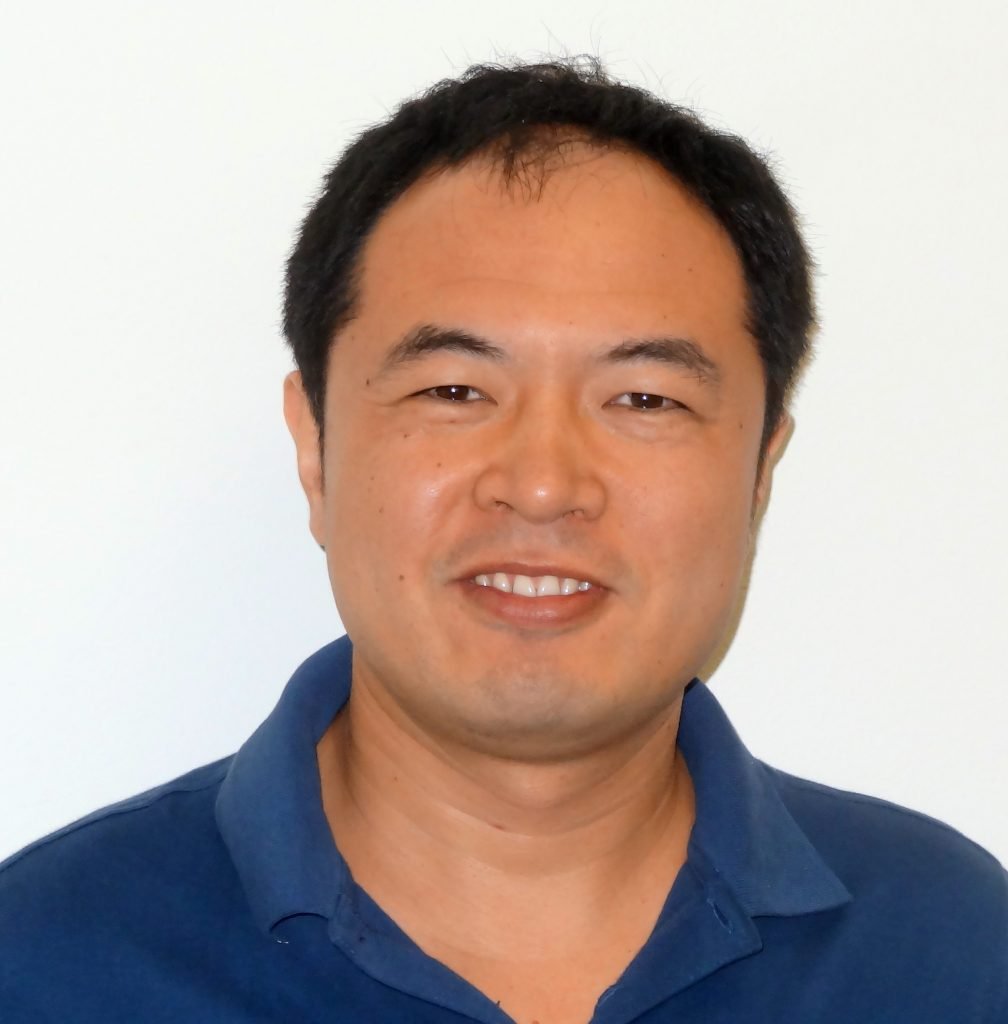
Assistant Professor Weihua Zhou, Applied Computing, will present a Chemistry department seminar on Friday, February 12, 2021, from 3:00 to 4:00 p.m. He will present ” Artificial intelligence for medical image analysis: our approaches.”

Assistant Professor Weihua Zhou, Applied Computing, will present a Chemistry department seminar on Friday, February 12, 2021, from 3:00 to 4:00 p.m. He will present ” Artificial intelligence for medical image analysis: our approaches.”
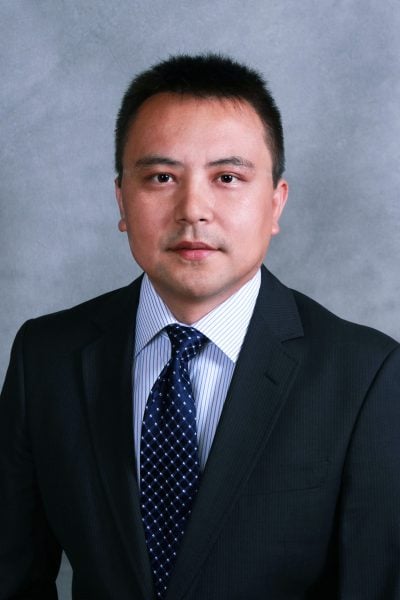
A scholarly paper co-authored by Assistant Professor Sidike Paheding, Applied Computing, is one of two papers to receive the 2020 Best Paper Award from the open-access journal Electronics, published by MDPI.
The paper presents a brief survey on the advances that have occurred in the area of Deep Learning.
Paheding is a member of the Institute of Computing and Cybersystems’ (ICC) Center for Data Sciences (DataS).
Co-authors of the article, “A State-of-the-Art Survey on Deep Learning Theory and Architectures,” are Md Zahangir Alom, Tarek M. Taha, Chris Yakopcic, Stefan Westberg, Mst Shamima Nasrin, Mahmudul Hasan, Brian C. Van Essen, Abdul A. S. Awwal, and Vijayan K. Asari. The paper was published March 5, 2019, appearing in volume 8, issue 3, page 292, of the journal.
Papers were evaluated for originality and significance, citations, and downloads. The authors receive a monetary award , a certificate, and an opportunity to publish one paper free of charge before December 31, 2021, after the normal peer review procedure.
Electronics is an international peer-reviewed open access journal on the science of electronics and its applications. It is published online semimonthly by MDPI.
MDPI, a scholarly open access publishing venue founded in 1996, publishes 310 diverse, peer-reviewed, open access journals.
In recent years, deep learning has garnered tremendous success in a variety of application domains. This new field of machine learning has been growing rapidly and has been applied to most traditional application domains, as well as some new areas that present more opportunities. Different methods have been proposed based on different categories of learning, including supervised, semi-supervised, and un-supervised learning. Experimental results show state-of-the-art performance using deep learning when compared to traditional machine learning approaches in the fields of image processing, computer vision, speech recognition, machine translation, art, medical imaging, medical information processing, robotics and control, bioinformatics, natural language processing, cybersecurity, and many others.
This survey presents a brief survey on the advances that have occurred in the area of Deep Learning (DL), starting with the Deep Neural Network (DNN). The survey goes on to cover Convolutional Neural Network (CNN), Recurrent Neural Network (RNN), including Long Short-Term Memory (LSTM) and Gated Recurrent Units (GRU), Auto-Encoder (AE), Deep Belief Network (DBN), Generative Adversarial Network (GAN), and Deep Reinforcement Learning (DRL). Additionally, we have discussed recent developments, such as advanced variant DL techniques based on these DL approaches. This work considers most of the papers published after 2012 from when the history of deep learning began.
Furthermore, DL approaches that have been explored and evaluated in different application domains are also included in this survey. We also included recently developed frameworks, SDKs, and benchmark datasets that are used for implementing and evaluating deep learning approaches. There are some surveys that have been published on DL using neural networks and a survey on Reinforcement Learning (RL). However, those papers have not discussed individual advanced techniques for training large-scale deep learning models and the recently developed method of generative models.
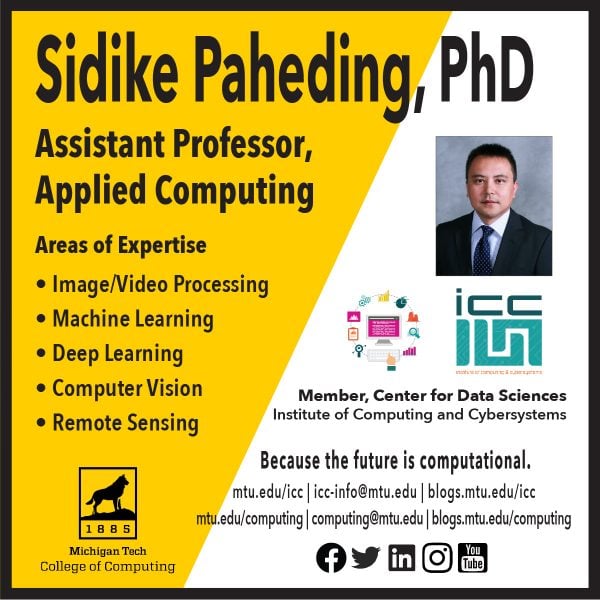
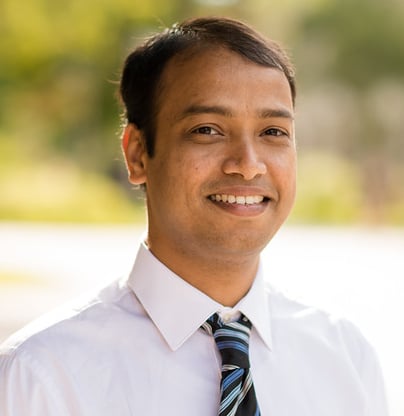
Assistant Professor Susanta Ghosh, ME-EM, has published the article, “Interpretable machine learning model for the deformation of multiwalled carbon nanotubes,” in the APS publication, Physical Review B.
Co-authors of the paper are Upendra Yadav and Shashank Pathrudkar. The article was published January 11, 2021.
Ghosh is a member of the Institute of Computing and Cybersystems’ Center for Data Sciences.
In the paper, researchers present an interpretable machine learning model to predict accurately the complex rippling deformations of multiwalled carbon nanotubes made of millions of atoms. Atomistic-physics-based models are accurate but computationally prohibitive for such large systems. To overcome this bottleneck, we have developed a machine learning model. The proposed model accurately matches an atomistic-physics-based model whereas being orders of magnitude faster. It extracts universally dominant patterns of deformation in an unsupervised manner. These patterns are comprehensible and explain how the model predicts yielding interpretability. The proposed model can form a basis for an exploration of machine learning toward the mechanics of one- and two-dimensional materials.
APS Physics advances and diffuses the knowledge of physics for the benefit of humanity, promote physics, and serve the broader physics community.
Physical Review B (PRB) is the world’s largest dedicated physics journal, publishing approximately 100 new, high-quality papers each week. The most highly cited journal in condensed matter physics, PRB provides outstanding depth and breadth of coverage, combined with unrivaled context and background for ongoing research by scientists worldwide.
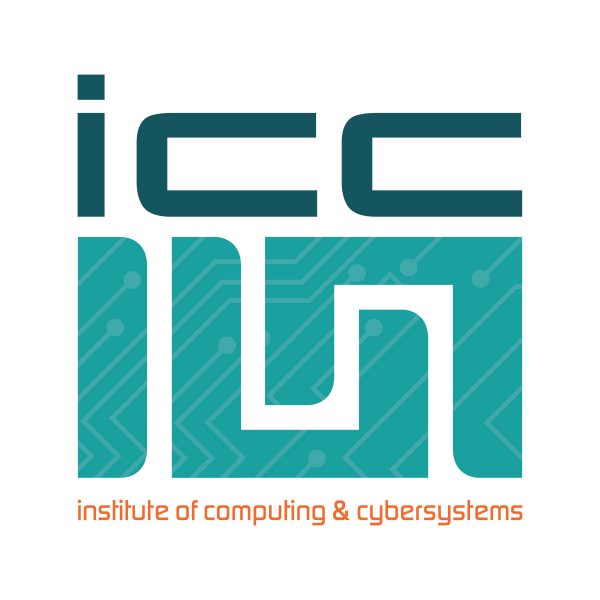
Thomas Oommen, Timothy C. Havens, Guy Meadows (GLRC), and Himanshu Grover (U. Washington) have been awarded funding in the NSF Civic Innovation Challenge for their project, “Helping Rural Counties to Enhance Flooding and Coastal Disaster Resilience and Adaptation.”
The six-month project award is $49,999.
Vision. The vision of the new project is to develop methods that use remote sensing data resources and citizen engagement (crowdsourcing) to address current data gaps for improved flood hazard modeling and visualization that is transferable to rural communities.
Objective. The objective of the Phase-1 project is to bring together community-university partners to understand the data gaps in addressing flooding and coastal disaster in three Northern Michigan counties.
Thomas Oommen is a professor in the Geological and Mining Engineering and Sciences department. His research efforts focus on developing improved susceptibility characterization and documentation of geo-hazards (e.g. earthquakes, landslides) and spatial modeling of georesource (e.g. mineral deposits) over a range of spatial scales and data types. Oommen is a member of the ICC’s Center for Data Sciences.
Tim Havens is associate dean for research, College of Computing, the
William and Gloria Jackson Associate Professor of Computer Systems, and director of the Institute of Computing and Cybersystems. His research interests include mobile robotics, explosive hazard detection, heterogeneous and big data, fuzzy sets, sensor networks, and data fusion. Havens is a member of the ICC’s Center for Data Sciences.
Guy Meadows is director of the Marine Engineering Laboratory (Great Lakes Research Center), the Robbins Professor of Sustainable Marine Engineering, and a research professor in the Mechanical Engineering-Engineering Mechanics department. His research interests include large scale field experimentation in the Inland Seas of the Great Lakes and coastal oceans; nearshore hydrodynamics and prediction; autonomous and semi-autonomous environmental monitoring platforms (surface and sub-surface); underwater acoustic remote sensing; and marine engineering.
Himanshu Grover is an asssistant professor at University of Washington. His research focus is at the intersection of land use planning, community resilience, and climate change.
The NSF Civic Innovation Challenge is a research and action competition that aims to fund ready-to-implement, research-based pilot projects that have the potential for scalable, sustainable, and transferable impact on community-identified priorities.
Michigan Tech’s Health Research Institute (HRI) will host a panel discussion on Monday, January 25, 2021,, from 12:00 to 1:00 p.m.
Health research at Michigan Tech has been steadily growing for over 10 years. This growth has led to many practical uses for the technology developed. Three researchers, Dr. Megan Frost (Kinesiology and Integrative Physiology), Dr. Bruce Lee (Biomedical Engineering), and Assistant Professor Dr. Weihua Zhou (College of Computing) will discuss their experiences with start-ups and applying their research to relevant health problems.

Please join the College of Computing’s Tim Havens at a College of Computing Undergraduate Overview on Tuesday, January 19, from 7:00 to 8:00 p.m. The virtual event is presented by Michigan Tech Admissions. The focus of the event is on prospective students.
Event Details: Check out our diverse selection of majors, including Computer Network and System Administration, Computer Science, Cybersecurity, Electrical Engineering Technology, Mechatronics, Software Engineering, and our first-year computing undecided program, General Computing.
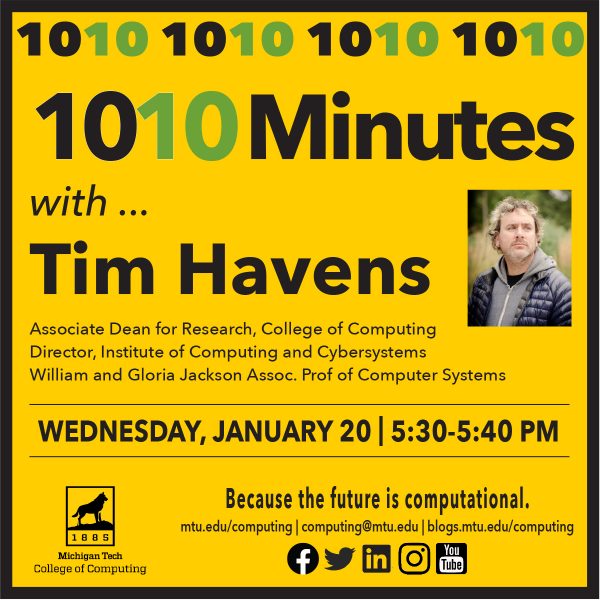
You are invited to spend one-zero-one-zero—that is, ten—minutes with Dr. Timothy Havens on Wednesday, January 20, from 5:30 to 5:40 p.m. EST.
Havens is the Associate Dean for Research in the College of Computing, Director of the Institute of Computing and Cybersystems, and the William and Gloria Jackson Associate Professor of Computer Systems at Michigan Tech.
In this informal discussion, Havens will talk about undergraduate research opportunities at Michigan Tech, his research in AI and machine learning, and answer your questions about the College of Computing.
We look forward to spending 1010 minutes with you!
Computer Science graduate student Taylor Morris will present a Master’s Defense on Tuesday, January 5, from 6:00 to 7:00 p.m.
Presentation Title: “Using Text Mining and Machine Learning Classifiers to Analyze Stack Overflow.”
Advisor: Associate Professor Laura Brown, Computer Science
Link to the Michigan Tech Events Calendar entry here.
Mobility is an increasingly used word today in conjunction with the advent of automated vehicle technologies, but what else is covered under this term that is often defined as“the ability to move or be moved freely and easily“? Even more importantly, what is happening at Michigan Tech related to Mobility? Dr. Pasi Lautala (CEE) is working as a Faculty Fellow sponsored by the Vice President for Research Office toward building a collaborative environment for Mobility-related development and research and expanding Michigan Tech’s role as a leader in the field.
As a kickoff event for these efforts, Dr. Lautala will be hosting a virtual panel discussion on Tuesday, January 5th, from 3:00-4:30 p.m. (EST). This virtual event will bring together leading Mobility experts from our Michigan Tech community to discuss the wide range of issues addressed under the umbrella of Mobility. The panelists will start the event by briefly introducing how they and their teams are involved in Mobility, followed by an hour-long open discussion on Mobility and related issues. We encourage all university and local community members interested in Mobility to tune in and participate in the discussion.
The panelists will include:
This panel discussion is the first in a series of events related to Mobility planned for the spring semester, and will largely focus on the current state of Mobility at Michigan Tech. Following events will seek to bring in external experts to share their insights and begin to develop building blocks that will lay the foundation for specific Mobility-related collaborative research proposals.
To participate in the event, use the Zoom link provided below. For more information, please contact Pasi Lautala at ptlautal@mtu.edu.